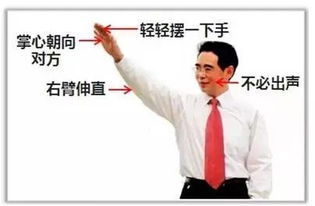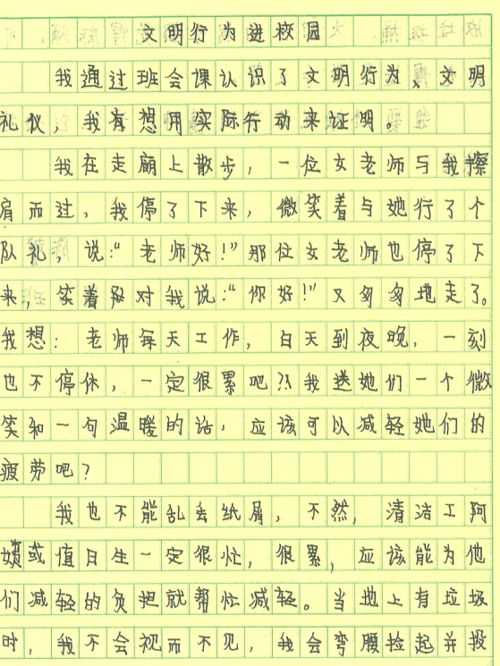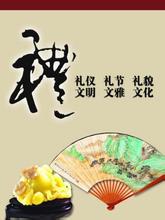1.关于文明礼仪的名人名言要英文的
健康的人未察觉自己的健康,只有病人才懂得健康。
卡莱尔 A healthy mind is in a healthy body. Juvenal, ancient Roman satirist 健康的思想寓于健康的身体之中。 古罗马讽剌家 朱文诺尔 A light heart lives long. William Shaakespeare, British dramatist 英国剧作家莎士比亚.W. A man needs a purpose for real health. Sherwood Anderson, American novelist 有目标的人才能有真正的健康。
美国小说家安德森.S. An apple a day keeps the doctor away. Anonymous 每日一个苹果胜过灵丹妙药。 无名氏 An irritable man is like a hedgehog rolled up the wrong way, torment-ing himself with his own prickles. Thomas Hood, British poet 易怒的人像一只反过来卷缩的刺猬,用自己的刺折磨自己。
英国诗人胡德 。.T.Bath twice a day to be really clean. once a day to be passably clean, once a week to avoid being a public menace. nthony Burgess. British novelist 一天洗两次澡是真干净,一天洗一次澡也说的过去,一周洗一次只是避免对公共场合造成污染。
英国小说家伯吉斯.A. Bitter pills may have blessed effects. Anonymous 良药苦口利于病。 无名氏 Cheerfulness is the promoter of health. Joseph Addison, British writer 心情愉快是健康的增进剂。
英国作家阿狄生。J. Diseases of the soul are more dangerous than those of the body. M. T Cicero.Ancient Roman orator and statesman 心灵上的疾病比身体上的疾病更危险。
古罗马演说家、政治家西塞罗.M.T. Early to bed and early to rise, makes a man healthy, wealthy and wise. Benjamin franklin, American president 早睡早起会使人健康、富有和聪明。 美国总统富兰克林。
B. Good health is a corollary of having good habits. Anonymous 健康的身体是良好生活习惯的结果。 无名氏 Happiness lies, first of all, in health. G.W. Curis, American writer 幸福首先在于健康。
美国作家寇第斯。G.W. Health is better than wealth. John Ray, American naturalist 健康胜过财富。
美国博物学家雷伊,J. Health is certainly more valuable than money, because it is by health that money is procured. Samuel Johnson. British writer, critic 健康当然比金钱更为重要,因为我们赖以获得金钱的就是健康。 英国作家、批评家约翰.S. If you believe the doctors, nothing is wholesome; if you believe the soldiers, nothing is safe. Robert Salisbury, British statesman 要是相信医生的话,什么也不卫生;要是相信士兵的话,什么也不安全。
英国政治家索尔兹伯里。R. Laugh, and the world laughs with you;snore and you sleep alone. Anthony Burgess, British novelist 笑,全世界都跟你笑;打鼾,只有你自己独自睡觉。
英国小说家伯吉斯.A. Mischief comes by the pound and goes away by the ounce. Anonymous 病来如山倒,病去如抽丝。 无名氏 No animal ever invented anything so bad as drunkness----- or so good as drink. Gibert Keith Chesteerton, British writer 没有动物发明过的像喝醉这样糟糕的事——也没有发明过像饮酒这样美好的享受。
英国作家切斯特顿.G.K. None so old that he hopes not for a year of life. John Ray, American naturalist 寿星也不会嫌寿长。 美国博物学家雷伊.J. One cannot help being old, but one can resist being aged. H.L.Samusel.British philosopher and writer 一个人无法不变老。
但是他可以抵制衰朽。 英国哲学家、作家塞缪尔。
H.L. Physicians of all men are most happy; most good success so ever they have, the world proclaimth, and what faults they commit, the earth coverth. Francis Quarles, British poet 世界上最幸福的人莫过于医生,他们的丰功伟绩为世人称颂,而他们的过失则被黄土淹没了。 英国诗人夸尔斯.F. Sickness is felt, but health not at all. Thomas Fuller.British statesman 疾病能感觉到,健康却根本感觉不到。
英国政治家富勒.T. Sloth, like rust, consumes faster than labor wears. Benjamin Franklin, American president 懒惰像生锈一样, 比操劳更能消耗身体。 美国总统富兰克林。
B. The cure for anything is salt water ------sweat, tears, or the sea. Isak Dinesen, Danish writer 咸水——汗水、泪水、或者海水是治疗一切的良药 丹麦作家丁尼生。I The love of beauty is an essential part of all healthy human nature. John Ruskin, British writer and critic 爱美是健康人天性的重要组成部分。
英国作家、批评家罗斯金.J. There are no such things as incurable, there are only things for which man has not found a cure. Bernard Baruch, American economist 没有什么不治之症,只有人类尚未发现其疗法之症 美国经济学家巴鲁克.B. There is a great difference between exposure of the mind and that of the body. William Hazlitt, British critic and essayist 表露思想与展露身体之间存在极大的不同。 英国批评家、散文家哈兹里特 .W. Without health no pleasure can be tasted by man. Henry Bollingbroke, British statesman 没有健康就没有乐趣。
英国政治家博林布鲁克。H. A light heart lives long .( William Shakespeare , British 。
2.西方节日 文明礼仪 英语谚语 名人英文介绍 (全用英语说)
第一节 新年(New Year)1. Calendar犹太历七月的第一天;伊斯兰教历第一个月的第一天;格列高利历 (Gregorian calendar),公历或阳历。
为纪念1582年罗马教皇格列高利十三世(Pope Gregory XIII)采用此历而命名的。按阳历或公历,新年从1月1日(January 1)开始。
在元旦这一天,人们辞旧迎新(to see the old year out and the new year in)。2. Wishes :Happy New Year .Happy New Year to you. wish a happy New Year.Thank you, the same to you.恭喜发财, 身体健康,万事如意。
3. Celebrations由于文化和习俗的不同,各国人民庆祝元旦和新年的方式和形式也有一定的差异。在西方国家,尽管圣诞节才是最大的节日,新年在人们心目中仍占有不可替代的重要地位。
除夕之夜(New Year\'s Day)晚会是庆祝新年到来必不可少的活动。西方各国的人们都喜欢在欢快的乐曲和绚丽的光彩中喜气洋洋地度过一年的最后一个夜晚。
此时,化装晚会特别受欢迎。来宾们把尊严和谨慎藏在面具之后,打扮得稀奇古怪。
大家无拘无束,尽情玩乐,与平日的行为大相径庭。在英美两国,午夜钟声一响,参加晚会的人们还要手拉手高唱"友谊地久天长"这首著名的苏格兰民歌。
第二节 圣诞节(Christmas)圣诞节是基督教徒纪念耶酥基督(Jesus Christ)诞生 的日子,公认的日期是12月25日。圣诞节本是一个宗教性的节日,后来逐渐演变成一个具有民族风格的全民性的节日,在美国、英国、加拿大、德国、意大利、澳大利亚等西方国家,甚至非洲,东南亚一些国家都很盛行。
圣诞节指圣诞日(Christmas Day)或 圣诞节节期(Christmas tide),即12月24日至第二年1月6日这段时间。另外人们把12月24日夜为圣诞前夜(Christmas Eve)。
1. Jesus Christmas耶酥是基督教的创始人,上帝的儿子。约公元前6年,耶酥由圣母玛利亚(St. Mary)因圣灵降孕而生,降生在耶路撒冷附近伯利恒一家客店的马棚里。
耶酥长大后开始传道,并召集了十二门徒。他认为要想拯救地球人类,就要对当时的犹太教进行改革,于是提出了一系列自己的宗教主张,但是由于他的言论和行为与当时的犹太统治者及社会当权者发生冲突,耶酥被门徒之一犹大出卖,后被钉死在十字架上。
耶酥死后三天升天。他的门徒继承他的事业继续传教布道。
2. Christmas tree圣诞树可以说是圣诞节最重要的装饰点缀物。圣诞树通常使用整棵塔形常绿树(如衫、柏等),或用松柏树枝扎成一棵塔形圣诞树。
树上挂满了闪闪发光的金银纸片、用棉花制成的雪花和五颜六色的彩灯、蜡烛、玩具、礼物等装饰品。树顶上还装有一颗大星,树上的彩灯或蜡烛象征耶酥是世界的光明,大星则代表耶酥降生后将三位东方贤人引到伯利恒的那颗星。
圣诞树的起源众说不一。3. Santa Claus/ Father Christmas圣诞老人是西方老幼皆知的典型形象,是圣人与神灵的结合体,是仁爱与慷慨的代名词。
一般认为圣诞老人是一个留着银白胡须、和蔼可亲的老人。他头戴红色尖帽,身穿白皮领子的大红袍,腰间扎着一条宽布带。
传说圣诞老人在圣诞夜驾着八只鹿拉的满载着礼品的雪橇,从北方雪国来到各家,由烟囱下来,经过壁炉到房间内,把糖果、玩具等礼品装进孩子们吊在壁炉和床头上的袜子里。相传圣诞老人是罗马帝国东部小亚细亚每拉城(今土耳其境内)的主教圣尼古拉的化身。
17世纪荷兰移民把圣诞老人的传说带到了美国。美国英语中的圣诞老人为“圣塔?克劳斯”(Santa Claus),在荷兰语中原为“圣尼古拉”。
圣尼古拉主教生前乐善好施,曾暗地里赠送金子给一农夫的三个待嫁的女儿作嫁妆,将一袋金子从烟囱扔进去,恰好掉在壁炉上的一只长统袜中。所以现在在圣诞夜有不少天真的孩子都把袜子口朝上小心翼翼地吊在壁炉旁或床头,期待圣诞老人送来礼物。
在现代英美等国家,有不少百货商店为吸引和招揽顾客,在圣诞节期间会专门派人扮成圣诞老人,向来商店购物的顾客(尤其是顾客带的孩子)分发糖果和礼品。4. Christmas cards and Christmas presents按照习俗,过圣诞节时人们都互赠圣诞贺卡和圣诞礼品。
贺卡可以在商店买到,也可以自制,只要写上一句祝词,写上自己的姓名就行了。赠贺卡一般要根据对方的年兴趣爱好以及与自己的关系等。
不仅同事、同学、朋友之间互赠,家庭成员之间也有互赠贺卡和礼品的习惯。这是一种最普通的庆祝圣诞节的活动。
5. Christmas dinner圣诞餐是圣诞节当天的主餐,有的家庭把它安排在中餐,有的把它安排在晚餐。这餐饭主要是家人聚餐,一般不邀请客人。
圣诞餐主要食品为:火鸡(turkey)或烤鹅(roast goose)、布丁(puddings)以及各类小甜饼(如golden butter cookies,fruit cookies)等。按照习俗,吃圣诞餐时,往往要多设一个座位,多放一份餐具, 据说这是为了“主的使者”预备的,也有的说是为一个需要帮助的过路人而准备的。
6. Christmas carol在圣诞夜(12月24日晚至25日晨),基督教徒们组织歌咏队到各教徒家去唱圣诞颂歌,传报佳音。据说,这是模仿天使在基督降生的那天夜里,在伯利恒郊外向牧羊人报告基督降生的喜讯。
颂歌很多,比如《平安夜》、《铃。
3.关于‘礼仪’的英语文章
Manners are important to happy relations among people. No one likes a person with bad manners. Good manners mean good behaviors in social communication. A person with good manners is always agreeable companion, because he is always thinking of others and respects others.
A person with good manners never laughs at people when they are in trouble. Instead, he tries to offer help. when he asks for something, he says “please” and when he receives something, he always says “thanks”。 He does not interrupt other people when they are talking. if he has to interrupt someone who is talking he need to say “ If you don't mind, may I say one word here?” or “ May I interrupt you a moment?” he does not talk loudly or laugh loudly in public. when he sneezes or spits, he uses a handkerchief.
Good manners are necessary because one is judged by his manners. One's manners not only show what kind of education he has received and what his social position is, but they also tend to show what his nature is.
4.求有关礼仪的名人名言(英文的)
All for one, one for all. 人人为我,我为人人。
—— [法] Dumas pére大仲马 Other men live to eat, while I eat to live. 别人为食而生存,我为生存而食。—— Socrates 苏格拉底 Easy come, easy go. 易得者亦易失。
—— Hazlitt赫斯特 Love rules his kingdom without a sword. 爱,统治了他的王国,不用一枝利剑。—— Herbert 赫伯特 We soon believe what we desire. 我们欲望中的东西,我们很快就信以为真。
—— Chaucer乔叟。
5.礼仪的习语(英语)一些关于礼仪的习语,越多越好,用英语表达.
表示邀请的常用句式有:1.Would you like to。
你愿意……吗?如:Would you like to come to my birthday party?你愿意来参加我的生日聚会吗?Would you like to go to the zoo with me?你愿意和我一起去动物园吗?2.I hope you can。我希望你能…….如:I hope you can come to my birthday party next Sunday.我希望你能来参加下周日我的生日聚会.I hope you can go to the cinema with us.我希望你能和我们一起去看电影.3.I'd / We'd like to invite.我/我们想邀请…….如:I'd like to invite you to my birthday party.我想邀请你来参加我的生日聚会.We'd like to invite you to go shopping with us.我们想邀请你和我们一起去买东西.4.Will you(please)。
请你……好吗?如:Will you please come to my home,Mary?玛丽,请你到我家来好吗?5.Can / Could you。你能……吗?如:Can / Could you come to play football?你能来踢足球吗?6.Do you want 。
你想……吗?如:Do you want to come with us?你想和我们一起来吗?[接受邀请的表白] 1.Yes / Certainly / Sure.I'd like / love to.是的,我很愿意去.(注:答语后面的“to”不可省略) 2.Yes.With pleasure.是的,我很荣幸.3.Yes,I'm glad to.是的,我很乐意.4.That's very kind of you.Thank you./ It's very nice of you.Thank you./ That would be very nice of you.Thank you.你太好了,5.I'd love to come.Thank you for inviting / asking me.我很高兴来,感谢你邀请我.[不能赴约的婉言谢绝] 1.That's very kind of you,but I'm afraid。你真是太好了,不过恐怕…….2.I'd love / like to,but I have to。
我很想来,但我不得不…….3.I'm very sorry,but I can't。很抱歉,可我不能…….4.Sorry,but I can't.Thank you all the same.对不起,但我不能.可是我仍然要谢谢你.[邀请到某人的高兴之情] 1.I'm so glad you can come.你能来我很高兴.2.It's a real pleasure to have you with us tonight.今晚能请到你们,真是太荣幸了.二、请求许可与你相约 [请求许可] 1.正式的请求用:May I 。
,please?语气十分委婉,意为“请问,我可以……吗?”.如:May I use your telephone,please?请问,我可以用一下你的电话吗?2.非正式的请求用:Could / Can I 。,please?意为“请问,我能……吗?”在这种句式中,用could比用can 语气委婉,显得有礼貌,而用can则指家人、朋友等不拘礼节的较为随便的场合.如:Could I open the windows,please?请问,我能打开窗户吗?[请求许可应答语] 同意请求的常用语:1.Yes./ Sure./ Certainly.当然可以.2.Of course,you may.当然可以 3.Yes,please.请吧.4.Go ahead,please.请吧.5.OK./ All right.好吧.6.No problem.没问题.7.Yes,you may (can).可以.不同意请求的常用语:1.No,please don't.请不要.2.I'm sorry you can't.对不起,你不可以.3.Sorry,I'm afraid not.对不起,恐怕不行.4.You'd better not 。
你最好别…….5.No,you mustn't.不可以.6.No,you can't.不能.[特别提示] 做某事可能引起对方不便或打扰别人时,常用:Do you mind if I do。意为“如果我做某事,你反对/介意吗?”如:Do you mind if I open the door.我打开门你介意吗?对Do you mind if I do。
进行应答时,如果表示“允许/不介意”,常说:No,I don't mind.我不介意/我允许.Certainly not / Of course not.当然不介意.No,go ahead.不介意,你干吧.Not at all.一点也不介意.如果表示“不允许/介意”时,常说:I'm sorry you can't .很抱歉,你不 能…….I'm afraid it's not allowed.恐怕这是不允许的.。


 0
0 2024-02-19 09:00
2024-02-19 09:00

















